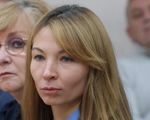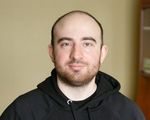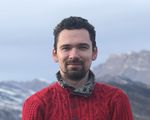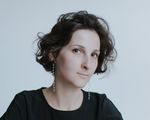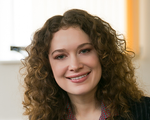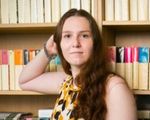About Success Builder
How do you find your place in life? How do you find something to do that both comes naturally to you and makes you happy? The answer is that you have to apply the knowledge you’ve gained from university and from life itself correctly. The Success Builder Project features HSE University graduates who have discovered themselves through an interesting business or an unexpected profession. The protagonists share their experiences and lessons learnt and talk about how they’ve made the most of the opportunities they were given.
HSE Perm graduate Anna Bykova built a successful academic career while also narrowing the gap between science and business as the head of the Agency for the Development of Small and Medium Enterprises of the Perm Region. In this interview with Success Builder, Ms. Bykova explained how to express leadership skills in an academic environment, why modern graduates are reluctant to go into the public sector, and why an HSE professor needs expertise in track.
How did you choose your academic and professional path?
My parents largely influenced my choice of education and career. Mom worked as an economist; Dad started with an engineering education and then took up economics and management, first working as the head of a municipal enterprise, and then moving to local government as a deputy head of the district. Around the 8th grade, I realized that I also wanted to major in economics, although at that time I was keen on studying at a theatre school and even thought about pursuing an acting career. But I understood that it was more important to get a practical profession.
I chose my educational path in the late 90s when HSE University was relatively unknown. My reference points were the Perm Classical University and the Polytechnic University, whose lyceum I entered in the 10th grade. At that time, the lyceum created a class in basic economics at HSE University in Perm. When I found out about this new university, I was very interested in the idea of studying there and fell in love with economics as a discipline because it was taught in a very interesting way. It was Lev Lyubimov’s visit to our lyceum that decided it for me; he oversaw the opening of the Perm branch of HSE and, as an ideologist, greatly influenced its development. After meeting him, I had no doubts about where to enroll, and after the 10th grade I focused on getting into this new and progressive university.
Applicants had to meet very high requirements; it was really difficult to get in and only the best of the best became HSE University students. At first, I paid full tuition, but after I got good grades in my first year, I received a scholarship. I was a diligent student and became involved in scientific activities from my sophomore year. After my junior year, I was offered my first chance to try teaching. In general, I had never thought about pursuing an academic or teaching career. Considering my parents’ example, I imagined myself more as working in the real sector or as the financial director of a company, for example. At the same time, I never saw myself as an entrepreneur and business owner.
Somehow, gradually and organically, I joined the academic environment. This was also facilitated by the fact that my mentor in working on the coursework was the dean of our faculty, Maria Molodchik, who inspired me greatly, and later we began to work together. It was Maria Molodchik who influenced my development as a researcher and teacher, shaped my professional values and even my attitude towards life and people. She taught me to demand a lot of myself and how to find a balance between family and work. By my 5th year, I was already teaching full-fledged microeconomics seminars for first-year students. So my graduation seamlessly flowed into the beginning of the new academic year as a teacher in the economic theory department.
You initially planned to work in the real sector. Have you ever wanted to try doing that?
The whole point is that I liked teaching. I didn’t expect to be so passionate about this role and about science in general. I already understood while I was working on my PhD thesis that it wouldn’t pan out, so I made more effort to succeed in research.
For me, academic work is totally creative; you are constantly faced with non-standard tasks that force you to develop
Teaching also improves communication skills and breaks up the routine. When working on my research, I chose the topic of intellectual resources and Maria Molodchik helped me a lot. After defending my thesis, I immediately enrolled in graduate school at HSE to do research and teach.
Along with my studies, I began working in the Laboratory of Investment Analysis that later evolved into the International Laboratory of Intangible-driven Economy. At first, we had a research and educational group of three people. Then we won a grant that enabled the laboratory to grow significantly and receive international status. In terms of expertise in the field of economics of intellectual resources and the number of high-quality publications by its employees, it now occupies a leading position among the best and most active scientific departments at HSE University.
As a researcher, why were you interested in topics related to regulators?
My senior colleagues conducted research primarily in business and I wanted to join them. We studied the activities of various companies, how they interact with counterparties and what effect they have on the national economy. One of the key counterparties is the state, so we study the effect of various government mechanisms on the activities of companies, and my dissertation was devoted to the topic of cluster development and the role of foreign investment in the activities of companies that are partially or fully state-owned.
This seemed like an interesting field, not only from the standpoint of data and topics, but also because the results of my work could really have a positive influence on the Russian economy.
What made you interested in a managerial role at a university?
HSE is one of the few universities that actively encourages its staff to develop and gives researchers opportunities not only to realise themselves in academia, but also to help develop their work environment. This is a young university; the average age of our staff is under 40 years. The university staff and teachers are very flexible, open, and like-minded, and many are HSE University graduates. The university administration knows everything about HSE and, as a rule, demonstrates its professionalism by making decisions for the benefit of the university’s development.
Because I joined the HSE University academic community with great pleasure, defended my dissertation well, and published a lot, I was given recognition by the leadership of the Perm campus. Ever since my school days, I have had strong managerial qualities, was always the head of my class, took part in the student council, chaired various committees, and was always organising something. This was a natural expression of my inner leader. This might be why I was named deputy dean of the faculty after I completed graduate school and defended my dissertation.
I still remember that the university was undergoing accreditation at the time and I was inundated with work. Of course, it was a lot of stress to start right then, but the situation allowed me to greatly improve my management skills. Even when I got used to doing many complex tasks at work, I continued trying to develop. If you want to stay interesting as a person, nothing is better than working at a university; it forces you to constantly improve yourself and move out of your comfort zone.
It is impossible to teach effectively if you don’t know the current situation in the world and don’t try to interpret fundamental material in light of those realities
For me this is not a burden, but a creative process. I think I succeed in different roles in university life because I contribute not only my knowledge to my work, but also my best qualities—and receive much more in return.
At what stage in your career did you become a civil servant and how?
I was offered a position in civil service after reaching the semi-finals of the Leaders of Russia competition. It was early 2020; I had just defended my dissertation and entered the PhD program at the University of Vigo in Spain.
Since my dad worked for a long time as the deputy head of the local municipality, I was well aware of the range of tasks that I had to face. There was much that needed improvement, and this became possible thanks to the new governor, Dmitry Makhonin, who assembled a new team of managers who were ready to truly devote themselves to the good of the region. When I was invited to join his team, I saw that this new regional head planned to work long and hard; the whole team warmly supported him and everyone was on fire.
I was offered to head a newly formed executive government body, which is responsible for small and medium-sized businesses, and I willingly agreed. People often ask me: How can you work in civil service? Isn’t it boring? In my department, there are no problems that are standard or easily solved. This greatly complements my work at HSE and provides ample opportunities to remain a flexible specialist, have the most up-to-date data on hand and directly influence the development of business activity in the region and country.
How do you use your research expertise in this position?
I continue doing research at the International Laboratory of Intangible Assets. Now I am more focused on the small and medium-sized enterprise sector, which I understand well from both sides. As a researcher, I can see where interesting academic questions arise and understand what’s behind the statistics we have.
Working in civil service gives me a unique opportunity to compare theoretical calculations to my own experience and understand how the data correlates with reality
This direct view of academic work from outside university laboratories is sorely lacking in modern science. I also continue to participate in seminars, prepare master’s theses and final qualification papers for students, and keep myself in good shape in terms of the research that we do with the students. In addition, I teach a master’s course in strategic financial management and constantly train myself in the field of corporate finance, familiarising myself with the latest works on this topic.
Are you planning to further develop your career in the public sector?
Yes, because for me this is not only a service, but also an opportunity to contribute to our region and state as an expert and leader. We develop long-term programmes for the development of small and medium-sized businesses, open and supervise new areas, and develop our teams.
There is still a lot of work to be done. In particular, we are responsible for the infrastructure that supports entrepreneurship and the Perm region’s My Business centre that has branches throughout the country. We are now actively supporting creative industries and e-commerce. We face a huge number of challenges, ranging from basic tasks of involving people from the so-called gray business sector in legal business activities to organising and conducting events to export Russian products and introduce innovations. Small and medium-sized businesses are the most flexible and responsive structures in terms of changes in the external environment, which also motivates me to work 24/7. I strongly feel a sense of incessant drive from my broad multitasking, which means I won’t have anything like a normal routine for at least the next few years.
Why did you decide to get your PhD, and why at the University of Vigo?
I didn’t go looking for a university because I knew in advance that I would go there. The University of Vigo is a partner university of our laboratory; we have joint research projects and articles in the field of corporate governance and the development of small and medium-sized businesses. Through our laboratory leaders Angel Barajas, Dennis Coates, Feliz Iturriaga, and Carlos Hardon, early-career members, including myself, gained not only invaluable knowledge of how to conduct empirical research, but also an understanding of how to gain entry into an international academic environment, start publishing and master the methods of conducting scientific work.
I was greatly influenced by the research topics of my mentors and their approach to work; I chose for myself a more narrow and applied topic of studying various instruments of government intervention in business. In particular, I researched the phenomenon of the influence of foreign investment on the economy of enterprises, wrote several articles and, quite logically, chose the University of Vigo to obtain a PhD degree. In addition, my supervisor worked there and it was possible to study remotely, because at that time I was not only a young scientist, but also the mother of two small children, so this was the optimal option.
Why are current graduates reluctant to work in the public sector and what could make them interested in it?
The reason is simple: the public sector can’t compete in terms of salaries and is therefore not a very prestigious place for the best graduates, including those from HSE University. Working in government agencies is currently attractive because it allows for a creative approach to work and is a stable sector of the labour market, which employees like. For example, our division is new and developing very well, so building a career here is not only possible, but also profitable in terms of your rate of growth. At the same time, you constantly have a connection with business, can prove yourself as an expert, and you can improve your competencies in order to develop your social capital.
One of the most sought-after qualities in our work is soft skills. Because you are interacting with businesses, it is very important to demonstrate psychological stability, the ability to present yourself, conduct constructive dialogues and persuade people. When recruiting and training new employees, I often encountered a lack of these qualities, as well as analytical skills, creativity, and data skills. In my two years of working in government agencies, we used continuing education to achieve the quality of information processing that was needed, but it isn’t possible to hire someone who comes to the job with those skills already.
Working at a government agency is for those who aren’t yet ready to settle into a routine and who are looking for a position where they can realise their potential as a specialist and an individual
All the members of the new governor’s team, including myself, break the stereotype of government officials being aloof and as far removed as possible from the common man and his needs. For example, entrepreneurs call me at any time of the day or night on a variety of issues, and the office doors are always open. Therefore, for a graduate who values self-realisation and making a difference in society when looking for a job, the public sector is an extremely promising area.
With such a workload, how do you manage to find time for sports?
I have liked sports since childhood. I ski and play chess. In this I was also influenced by my parents’ passion for a healthy lifestyle. They met playing tennis, and it so happened that my brother and I were raised with a focus on physical activity—which greatly supports your mental activity. At some point, I became interested in running and began participating in marathons, even while studying, taking care of my family, and working at the university—from which I literally left classes to go to the hospital to give birth, and then went back to work three days later. I am a socially active person, but sport for me is a way to be alone with myself and sort everything out.
Because self-development is a life principle for me, I also set the goal of achieving something significant as a runner. I started training with a coach, and in 2020, was immediately listed in the senior category, second rank, on a very difficult track. That success inspired me; now I train with an international master of sport 3-4 times a week to prepare for national races. My daughter does rhythmic gymnastics and my son plays football and chess; this is how it has been passed along in our family. Sports help you keep yourself in shape and teach you discipline; in any weather, at any time of year, in any mood, you have a training plan, and you must follow it. This is my rule in life that enables me to achieve results and I get a lot of pleasure from it.




